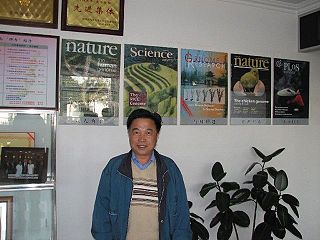Related Research Articles

Yang Huanming, also known as Henry Yang, is a Chinese biologist, businessman and one of China's leading genetics researchers. He is Chairman and co-founder of the Beijing Genomics Institute, formerly of the Chinese Academy of Sciences. He was elected as member of the Chinese Academy of Sciences in 2007, a foreign academician of Indian National Science Academy in 2009, a member of the German National Academy of Sciences in 2012, and foreign associate of the US National Academy of Science in 2014.

Arthur L. Caplan is an American ethicist and professor of bioethics at New York University Grossman School of Medicine.

Bartha Maria Knoppers, OC OQ is a Canadian law Professor and an expert on the ethical aspects of genetics, genomics and biotechnology.

The Hastings Center is an independent, nonpartisan bioethics research institute and think tank based in Garrison, New York. It was instrumental in establishing the field of bioethics and is among the most prestigious bioethics and health policy institutes in the world.
Albert R. Jonsen was one of the founders of the field of Bioethics. He was Emeritus Professor of Ethics in Medicine at the University of Washington, School of Medicine, where he was Chairman of the Department of Medical History and Ethics from 1987 to 1999. After retiring from UW, he returned to San Francisco, where he co-founded the Program in Medicine and Human Values at Sutter Health's California Pacific Medical Center in 2003.

Carola Blitzman Eisenberg was an Argentine-American psychiatrist who became the first woman to hold the position of dean of students at Massachusetts Institute of Technology. From 1978 to 1990, she was the dean of student affairs at Harvard Medical School (HMS). She has for a long time been lecturer in the newly renamed Department of Global Health and Social Medicine at HMS. She was also both a founding member of Physicians for Human Rights and an honorary psychiatrist with the Massachusetts General Hospital in Boston, a longstanding position there.
National Commission for the Protection of Human Subjects of Biomedical and Behavioral Research was the first public national body to shape bioethics policy in the United States.
Jonathan D. Moreno is an American philosopher and historian who specializes in the intersection of bioethics, culture, science, and national security, and has published seminal works on the history, sociology and politics of biology and medicine. He is an elected member of the National Academy of Medicine.

Anita LaFrance Allen is the Henry R. Silverman Professor of Law and professor of philosophy at the University of Pennsylvania Law School. She was formerly Vice Provost for Faculty from 2013 to 2020.
Tom Lamar Beauchamp is an American philosopher specializing in the work of David Hume, moral philosophy, bioethics, and animal ethics. He is Professor Emeritus of Philosophy at Georgetown University, where he was Senior Research Scholar at the Kennedy Institute of Ethics.
Wendy K. Mariner is an American academic who is the Edward R. Utley Professor of Health Law, Bioethics & Human Rights in the Department of Health Law, Bioethics & Human Rights, at the Boston University School of Public Health. She is also a professor of law at Boston University School of Law and a professor of socio-medical sciences and community medicine at Boston University School of Medicine.
The President's Commission for the Study of Ethical Problems in Medicine and Biomedical and Behavioral Research was a bioethics organization in the United States.

The Personal Genetics Education Project (pgEd) aims to engage and inform a worldwide audience about the benefits of knowing one's genome as well as the ethical, legal and social issues (ELSI) and dimensions of personal genetics. pgEd was founded in 2006, is housed in the Department of Genetics at Harvard Medical School and is directed by Ting Wu, a professor in that department. It employs a variety of strategies for reaching general audiences, including generating online curricular materials, leading discussions in classrooms, workshops, and conferences, developing a mobile educational game (Map-Ed), holding an annual conference geared toward accelerating awareness (GETed), and working with the world of entertainment to improve accuracy and outreach.

Mildred Z. Solomon is an American bioethics researcher.

Yvonne T. Maddox is an American academic who currently works as vice president for research at the Uniformed Services University. She was previously the acting director of the National Institute on Minority Health and Health Disparities. Her career at the National Institutes of Health also includes previous leadership roles as acting deputy director of the National Institutes of Health and deputy director of the Eunice Kennedy Shriver National Institute of Child Health and Human Development.
The acronyms ELSI and ELSA refer to research activities that anticipate and address ethical, legal and social implications (ELSI) or aspects (ELSA) of emerging sciences, notably genomics and nanotechnology. ELSI was conceived in 1988 when James Watson, at the press conference announcing his appointment as director of the Human Genome Project (HGP), suddenly and somewhat unexpectedly declared that the ethical and social implications of genomics warranted a special effort and should be directly funded by the National Institutes of Health.
Eric M. Meslin PhD FRSC FCAHS is a Canadian-American philosopher-bioethicist and current President and CEO of the Council of Canadian Academies (CCA).

Christine Grady is an American nurse and bioethicist who serves as the head of the Department of Bioethics at the National Institutes of Health Clinical Center.
Charmaine DM Royal is an American geneticist and Associate Professor at the Institute for Genome Sciences & Policy and the Department of African and African American Studies at Duke University. She studies the intersections of race, ethnicity, ancestry genetics, and health, especially as they pertain to historically marginalized and underrepresented groups in genetic and genomic research; and genomics and global health. Her major interest is in addressing root causes and implementing sustainable solutions regarding problems of race and racism in research, healthcare, and society. Royal is a Human Heredity and Health in Africa (H3Africa) Independent Expert Committee (IEC) member appointed by the National Institutes of Health (NIH) and is a 2020 Ida Cordelia Beam Distinguished Visiting Professor at the University of Iowa.

Wylie Burke is a Professor Emerita and former Chair of the Department of Bioethics and Humanities at the University of Washington and a founding co-director of the Northwest-Alaska Pharmacogenomics Research Network, which partners with underserved populations in the Pacific Northwest and Alaska.
References
- 1 2 "Georgetown Law Timeline". www.law.georgetown.edu. Retrieved April 17, 2020.
- 1 2 3 4 5 6 7 Courtl; Milloy (April 2, 1996). "A Teacher, A Scholar of Living". The Washington Post. ISSN 0190-8286 . Retrieved April 17, 2020.
- 1 2 3 4 5 King, Patricia (April 2010). "Oral History of Patricia King" (PDF). Women Trailblazers in the Law (Interview). Interviewed by Naomi Mezi. American Bar Association Senior Lawyers Division. Retrieved April 18, 2020.
- 1 2 3 4 Edelman, Marian Wright (December 5, 2014). "Needed: A True Diversity Map for America". HuffPost. Retrieved April 19, 2020.
- 1 2 Smith, John Clay (2000). "Clarence Thomas Should Not Sit on High Court". Rebels in Law: Voices in History of Black Women Lawyers. University of Michigan Press. pp. 131–136. ISBN 978-0-472-08646-7.
- ↑ "Award Descriptions". Wheaton College Massachusetts. Retrieved April 19, 2020.
- 1 2 United States Congress House Committee on Appropriations Subcommittee on Departments of Labor, and Health, Education, and Welfare, and Related Agencies (1973). Departments of Labor and Health, Education, and Welfare Appropriations for 1974: Hearings Before a Subcommittee of the Committee on Appropriations, House of Representatives, Ninety-third Congress, First Session. U.S. Government Printing Office. pp. 921–922.
{{cite book}}: CS1 maint: multiple names: authors list (link) - ↑ King, Patricia (April 1, 2012). "Address Inequalities Before Legalizing Assisted Suicide". www.nytimes.com. Retrieved April 19, 2020.
- ↑ Walter, Jennifer K.; Klein, Eran P. (October 8, 2003). "Chapter 10: The Dangers of Difference, Revisited". The Story of Bioethics: From Seminal Works to Contemporary Explorations. Georgetown University Press. ISBN 978-1-58901-469-5.
- 1 2 Walters, LeRoy B. (September 2, 2014). "Belmont Oral History Project | Patricia King". HHS.gov. Retrieved April 18, 2020.
- ↑ United States National Commission for the Protection of Human Subjects of Biomedical and Behavioral Research (1975). Research on the Fetus: Report and Recommendations (PDF).
- ↑ "Read the Belmont Report". HHS.gov. January 1, 2018. Retrieved April 18, 2020.
- 1 2 Fink, Leslie (June 2, 1990). "Bioethics Program Augments Genome Project" (PDF). The NIH Record. U.S. Department of Health and Human Services, National Institutes of Health. Retrieved April 18, 2020.
- ↑ Recombinant DNA Research. U.S. Department of Health and Human Services, Public Health Service, National Institutes of Health. 1976.
- ↑ Cook-Deegan, Robert M. (1996). "Chapter 16: A New Social Contract". The Gene Wars: Science, Politics, and the Human Genome (PDF). W. W. Norton & Company. ISBN 978-0-393-31399-4.
- ↑ Report of the Working Group on Ethical, Legal, and Social Issues Related to Mapping and Sequencing of the Human Genome (PDF) (Report). January 1990. Retrieved April 18, 2020.
- 1 2 "Patricia King to join Harvard Corporation". Harvard Gazette. December 8, 2005. Retrieved April 18, 2020.
- ↑ Bombardieri, Marcella (December 6, 2005). "First African-American Woman Named to Harvard Corporation – The Tech". tech.mit.edu. Retrieved April 18, 2020.
- ↑ Institute, The American Law. "Members". American Law Institute. Retrieved April 19, 2020.
- 1 2 "Member | Patricia A. King". National Academy of Medicine. Retrieved April 17, 2020.
- ↑ Council, Institute of Medicine and National Research (1998). Violence in Families: Assessing Prevention and Treatment Programs. ISBN 978-0-309-05496-6.
- ↑ "Excerpts From Hearing on Thomas's Nomination". The New York Times. September 1, 1991. ISSN 0362-4331 . Retrieved April 18, 2020.
- ↑ "Eight to receive honorary degrees". Harvard Gazette. May 2, 2014. Retrieved April 18, 2020.
- ↑ "Roger Wilkins, activist and historian whose Watergate editorials helped win a Pulitzer, dies at 85". Los Angeles Times. March 2, 2017. Retrieved April 18, 2020.